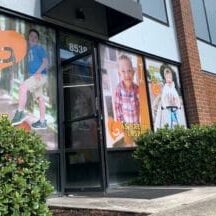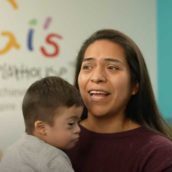A Letter to the Teacher of My Son with Down syndrome | Guest Blogger
It’s happening, the back to school ads are hitting, some have already had their first day back. The season is in the early stages of change and we are embarking on a new school year. We are so thankful to have an amazing guest blogger today With us. GiGi’s Playhouse friends, meet Courtney from Inclusion Evolution. Courtney is a former journalist and teacher, current advocate, proud military wife, and domestic engineer to 3 kids (one who happens to rock an extra chromosome). We think you will love what she has to share!
Dear Teacher,
Tis the season for organizing classrooms, lesson planning, and memorizing new names. When I was a teacher, this time of year brought a mixture of excitement and trepidation. Those emotions remain the same now that I’m a parent to a child with Down syndrome.
Instead of fearing that I would be ill-equipped to deal with a whole new group of students with different needs, I now dread that my son’s teacher will fear Down syndrome and what it means for his or her classroom.

I know, from personal experience, that even a Master’s in Education does not fully prepare teachers to meet the needs of all learners. Teacher training is often a one-size fits all approach, until the student-teacher is thrown to the wolves (I mean, students LOL). But here’s the most important thing you need to know to meet the needs of my son who has Down syndrome:
You don’t need a Master’s in Education to care and have an open-mind. Those two characteristics alone can lead to my child’s (and every other child’s) success in your classroom.
5 Things to Remember When Teaching a Student with an Intellectual Disability:
1. He’s more alike than different:

Imagine if the color of your eyes was the determining factor of whether you were cut out to be a teacher. Not cool, right? Troy has a right to the same educational opportunities as his typical twin brother. But the instant a teacher looks at my two boys side-by-side, many have already made a judgement that Troy just can’t cut it in a regular class.
“Different” is all about perspective. To you, my son may not fit the typical model-student mold, but to me he’s just as inquisitive and bright as his typical twin brother. Stop looking at those gorgeous almond-shaped eyes and his cute toddler-like stature; this kid wants to learn. Expect that he wants to act and learn like his typical peers, and you may be surprised at what he can achieve.
2. He needs you to believe in the power of “yet”
Our mindset determines the way we see the world. I want Troy’s teachers to have a “Growth Mindset.” This is the power of believing Troy can learn and improve. I’m not delusional. I understand my son has an intellectual disability, and will likely not “keep up” with his typical twin brother. But with a growth mindset it’s ok if he doesn’t keep up, because he has the power of “yet.”
He may not read and write when his typical peers do, but that doesn’t mean he’ll never read and write. It also doesn’t mean he deserves low expectations and subpar educational experiences. Whenever you feel the urge to say: “Troy can’t _______,” instead say “Troy can’t __________ YET.” This will change your entire perspective about Down syndrome and what my son can achieve.
3. He understands when he’s being segregated
Even with 40 years of federal law and research to back up full inclusion for students with intellectual disabilities, schools continue to segregate students like my son in “specialized” classes. Teachers and administrators say this is what’s best for these “special” students, but the research proves it’s not.
Listen, I understand that inclusion is hard and scary. But my son doesn’t deserve the path of least resistance. He’s smart enough to know that he’s being segregated from his typical peers, and he’ll live up to whatever expectations you set (low or high). We must prepare him for life, and as far as I know there’s no “special” grocery shops, apartments, or jobs when he graduates.
4. His typical peers have a lot to gain with his presence
Many teachers argue that having a student with intellectual disability in their class will be detrimental to their typical students. I disagree wholeheartedly! In fact, research shows that typical student achievementeither stays the same or increases with the presence of diverse-ability students. The reason is simple and has been known for generations: The best way to understand a concept is to teach it.
What a wonderful opportunity to teach empathy, and increase achievement levels of all your students. In a meaningful inclusive classroom, all students feel valued for who they are. High achieving students can reinforce what they’ve learned by teaching others, and students like my son can teach those same students that life is about more than just high grades and test scores.
5. More than anything, he needs an open-minded teacher
 You can know all the latest teaching strategies to optimize an inclusive classroom: Universal Design for Learning, Process Oriented Guided Inquiry Lessons, Reality Pedagogy, etc. But if you don’t have an open-mind none of these fancy strategies will work. I’d rather have a teacher who’s clueless about all of the above, but truly accepts Troy and believes he can learn than the smartest teacher around who thinks my son is helpless.
You can know all the latest teaching strategies to optimize an inclusive classroom: Universal Design for Learning, Process Oriented Guided Inquiry Lessons, Reality Pedagogy, etc. But if you don’t have an open-mind none of these fancy strategies will work. I’d rather have a teacher who’s clueless about all of the above, but truly accepts Troy and believes he can learn than the smartest teacher around who thinks my son is helpless.
It’s up to you to teach other students that my son’s disability is not to be feared. They’ll be watching you!
And remember, the parent of students with disabilities want their child’s teacher to succeed. Come to us for advice. We are the expert of our child, and we can be an invaluable asset to your classroom success. We appreciate you!
We know you may be scared, but our child and your students are worth it! Take the challenge and be the change that’s needed in this world!
With Much Appreciation,
The Parent of a Child Who Wants to be Included
Thank you Courtney!

educate.inspire.believe.
SaveSave




This is so great! Thank you for taking the time to share your heartfelt words of wisdom. I have the privilege of teaching at a school that embraces inclusion… and it is a Catholic School to boot. I am super excited to say that I will be blessed to have two little boys with Down’s Syndrome starting in my 4K class in a few short weeks. I already know that these little guys are going to touch any life they come in contact with. We are all so blessed. Super excited!